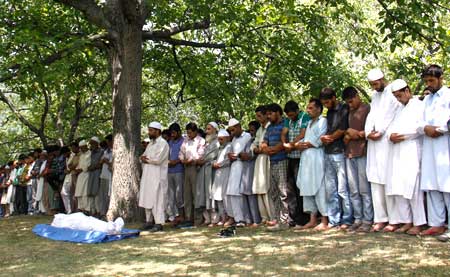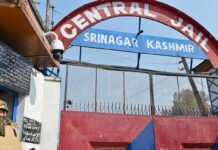Amid an unchanging legal atmosphere of impunity, civilian killings keep happening in a familiar manner amid claims of change. Two more recent civilian killings in Kashmir bring the most pertinent questions to the fore again. AHMAD RIYAZ analyses.

In the past week, Kashmir was once again roiled by the protests over the killing of two youth, allegedly by government forces. The murders followed a familiar trajectory – security personnel killing a civilian and then passing him off as a militant or simply washing their hands of any responsibility in the deed.
At Bandipore, it was a case of an army informer Muhammad Ramzan Bhat luring a 25-year-old youth Hilal Ahmad Dar into militancy and then getting him killed by the army. Preliminary police investigation has revealed that Ramzan brought Dar to a forest on the pretext of introducing him to foreign militants, provided him with a gun given to him allegedly by the army. He was actually led into an ambush set up for him by the army. Dar had incidentally brought along his friend Nazir Ahmad Bhat who was also provided a gun by Ramzan. Once the army saw Dar and Nazir approaching, they open fire killing Dar on the spot. Nazir miraculously escaped from the spot.
Cut to Shopian. An 18-year-old Aqib Yousuf Bhat used to supply water to a CRPF camp where the stationed personnel are said to have beaten him for not unloading the tanker in time. Police, however, say that the death was the result of an accident. Bhat is said to have come under his own vehicle. The incident put Shopian on boil. Protests rocked the town against the alleged atrocity.
In case of Shopian, security agencies or the government itself have not bothered to order a probe. The opposition PDP thinks a probe should have been the natural reaction to the protests in the town even if government believed that the death was the result of an accident.
“What matters is not what the government believes but what people think. If people suspect that the youth had died in mysterious circumstances it is incumbent on the government to probe and establish the truth,” says PDP spokesman Naeem Akhter. Akhter’s party had sought magisterial inquiry into the incident. “But government chose to ignore our demand.”
At Bandipore, the incident has more damning dimensions. We know that the informer Ramzan got his fellow villager killed for money, but we don’t know much about the culpability of the army unit. There are some pertinent questions that need answers: Who gave Ramzan arms? Why didn’t army follow Standard Operating Procedure which mandated informing the local police about the movement of foreign militants and the operation itself? Or whether Ramzan acted alone or was backed by army in his foul deed?
The probe should hopefully answer all these questions. Or it may very well not answer at all. We may never know the complete truth as has more often than not been the case. And the perpetrators will once again go scot-free. In fact, it is this climate of impunity more than anything else that has poisoned the atmosphere in the Valley. Fewer people have any stake in the system and hardly anybody is willing to trust the government as an honest adjudicator in a case of human rights violation.
According to analysts, the problem in Kashmir is that the truth is shaded gray. Or it has become one due to the experience of the past two decades. One may get to know shades of truth but never the entire truth. The kind of impunity that has been prevailing in the state has fundamentally undermined the faith of the people in the establishment.
Generally, in cases of the human rights violations, there is an attempt on the part of the government to hide the facts from people and when force of the circumstances prises open the truth, there is an attempt to obfuscate it. And if this too fails, effort shifts to shielding the accused. This is why, when an incident like that in Shopian takes place, people instinctively refuse to buy the official theory. And more often than not their perception of the incident turns out to be the truth.
It will need a long term credibility-salvaging effort by the government, more so by the security agencies, to get people to put faith back in the system. And this will involve, first and foremost, the punishment for the guilty in the most prominent cases of human rights violations over the past two decades.
Meanwhile in Shopian, as also in Bandipore where last week a youth was killed in an alleged staged encounter by army, we need a transparent investigation to establish the truth and hopefully followed by a speedy justice for the perpetrators of the crime.















